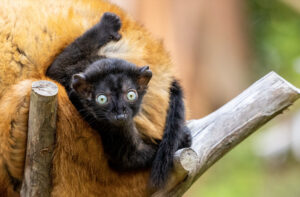
Two-month-old McAvoy clinging to mom Leigh. Photo by Sara Nicholson.
On April 5, 2023, the Duke Lemur Center’s animal technicians discovered during morning check-ins that blue-eyed black lemur Leigh had given birth overnight! Leigh, who had been moved into a “baby suite” in preparation only two days prior, showed up to breakfast with a 70g male infant clinging to her stomach.
McAvoy (“MACK-uh-voy”) is Leigh’s second infant, and her first with new breeding partner Lincoln. Like all blue-eyed black lemur infants born at the DLC, McAvoy was named after a blue-eyed celebrity. This little guy gets his name from Scottish actor James McAvoy, most famous for playing Charles Xavier in X-Men: First Class.

Leigh, with McAvoy in tow, follows partner Lincoln along a wooden bridge in one of our natural habitat enclosures. Photo by Sara Nicholson.
Blue-eyed black lemurs are sexually dichromatic, meaning males and females sport different colorations. Females range from reddish-brown to orange in color, while adult males are jet-black. In sexually dichromatic lemur species, infants are typically born with the same coloration as their mother, regardless of sex. Male blue-eyed black lemur infants gradually transition from orange to black in the first two months of life. McAvoy, surprisingly, was born almost completely black with only traces of orange along his back.
As their name suggests, blue-eyed black lemurs of both sexes have strikingly blue eyes. They are the only lemur species with eyes of this color, and they are the only primate species where every member is born with blue eyes.
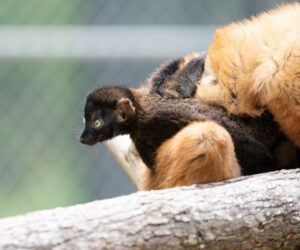
Two-month-old McAvoy still retains some of his orange baby hair. Photo by Sara Sorraia.
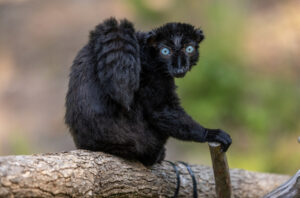
McAvoy’s dad, Lincoln, displays the typical coloration of adult male blue-eyed black lemurs. Photo by Sara Nicholson.
Blue-eyed black lemurs are critically endangered and are considered among the most threatened primates in the world. There are fewer than ten blue-eyed black lemur females of breeding age in North America. In 2015, it was estimated that the blue-eyed black lemur could go extinct in the wild in as little as 11 years due to habitat loss, forest fragmentation, and hunting pressures (Volameno et al.). It is thought that there may be fewer than 1,000 individuals of this species left in the wild.
McAvoy and his parents were born through the DLC’s conservation breeding program, which has celebrated over 3,405 births since the Lemur Center was founded in 1966. Together, blue-eyed black lemurs at the DLC and other institutions worldwide form a genetic safety net for their species. Each new birth helps sustain a healthy and genetically diverse population of blue-eyed black lemurs for the long-term future.
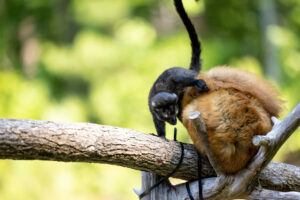
McAvoy has been gaining confidence and has begun to venture off mom’s back to explore the world around him. Photo by Sara Nicholson.
Lincoln has been a very respectful father, giving Leigh space to care for McAvoy during their first month with the new baby. Our animal caretakers frequently observe Lincoln sitting or sleeping just a few feet away from his partner and son.
The family began free-ranging in a two-acre forest enclosure at the end of May. Lincoln, a first-time free-ranger, initially seemed a little hesitant, but Leigh was confident thanks to prior experience out in the forest with former partner Quinn and their son, Brady. McAvoy seems to have plenty of energy and his mom’s adventurous spirit, so we expect to see him leaping through the trees in the near future!
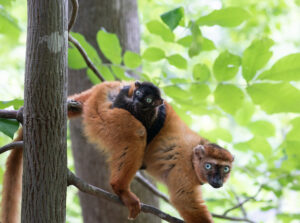
Leigh and McAvoy heading off to explore the forest! Photo by Sara Sorraia.
How Can I Help?
Want to help support the care of this critically endangered species? You can do so through our Adopt a Lemur program! Starting at just $50 per year, you can symbolically adopt McAvoy’s older brother Brady and receive a personalized adoption package, along with quarterly updates (with photos!) on Brady’s life. Adoptions are tax-deductible and make great gifts for the animal enthusiasts in your life, and your donation goes right back into animal welfare and conservation here at the DLC.

